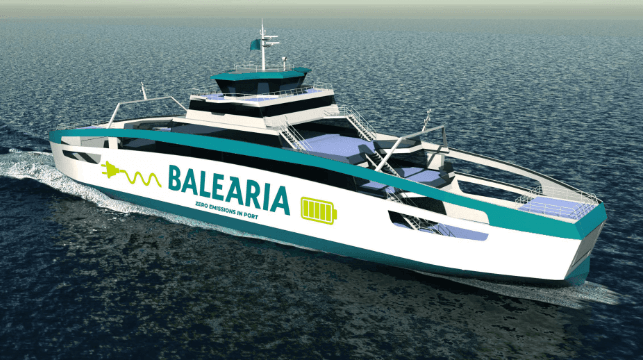Baleària Orders Electric Ferry to Reduce Emissions and Test Hydrogen

Spanish ferry operator Baleària which provides service to the Balearic Islands is building a hybrid-electric ferry which it says through the use of batteries and hydrogen will become the most sustainable ship in its fleet as well as a testing ground for future hydrogen technologies. The RoPax ferry is due to enter service in the summer of 2023 becoming the next step in the company’s efforts to reduce its environmental impact.
The new ferry, which is being built at the Armón shipyard in Vigo, Spain, will be a double-ended vessel measuring 272 feet in length. It will operate on a diesel-electric propulsion system that will include rechargeable electric batteries that will be used to power the ferry during entrances, departures, and stays in port. The batteries, which will be recharged during the voyage, will make it possible for the ferry to operate with zero emissions in and near its ports. The ferry will have an operating speed of 12.5 knots.
Baleària reports that the systems will improve propulsion performance and reduce emissions and noise, as well as maintenance. The new ferry will operate one-hour voyages between Ibiza-Formentera in the Pityusic Islands in the Mediterranean. Baleària expects that the vessel will improve air quality in the ports and surrounding areas by reducing greenhouse gas emissions by 80 percent compared to other ships operating on this route.
The new ferry will also be a test laboratory for future green hydrogen technologies. A 100 KW compressed hydrogen fuel cell, the largest currently available, will be installed to carry out a pilot experiment, which Baleària says could eventually be used for onboard electricity consumption.
"Our goal is to use this ship as a small-scale test laboratory to learn about this fuel and apply this knowledge in the long term when a more mature and stable storage system than the current compressed hydrogen is expected to be available," noted Baleària’s president, Adolfo Utor.
The design calls for the ferry to be able to carry 350 passengers as well as 14 trucks. It will have a range of passenger amenities including outdoor spaces and a large bar. The double-ended design will also make it possible to speed up embarkation and disembarkation as well as improve maneuvering in port.

that matters most
Get the latest maritime news delivered to your inbox daily.
"This ship is an important step forward, and for us it has an emotional component because, despite being small and simple, it aspires to be the most sustainable ship in the fleet, as it is electric and incorporates hydrogen technology on an experimental basis," said Utor. He also said the new ferry will be a key ship for supplying essential services to Formentera.
In 2021, Baleària introduced one of the largest LNG-fueled Incat Crowther-designed RoPax ferries operating to the Balearic Islands. The company is also completing the last of the six planned overhauls of its older vessels converting them to operate on LNG.
